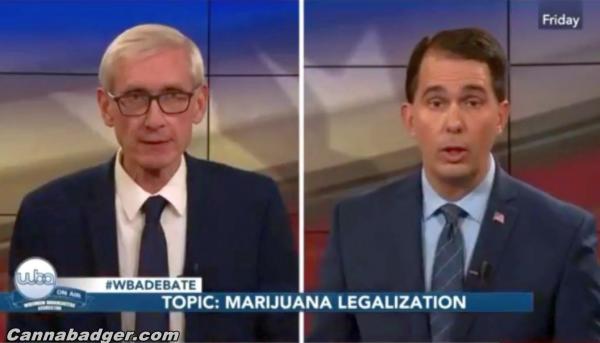The statewide elections being held Tuesday, Nov. 6 represent Wisconsin’s most important cannabis-related election ever. Not only are cannabis advisory referendums on the ballot in 16 counties and two cities, but there are numerous candidates supporting cannabis legalization up and down the ticket, starting with candidates for governor, attorney general. U.S. senate and other statewide offices all the way to the state senate and assembly. Never before have so many candidates embraced cannabis as a campaign issue, rather than opposing it or offering faint support at best, as seen in prior election cycles.
The Cannabadger Guide to the 2018 Wisconsin County Cannabis Advisory Referendums
Media coverage of the referendums has been historic too, first with the coverage of the referendums being approved for ballots, then as part of election campaign coverage.
For those who have not early-voted, polls open at 7am and close at 8pm across the state. Depending on the results, Wisconsinites might awake to a new day Wednesday where the longtime barriers to cannabis law reform have been removed.
Polling by Myers Research in early October found that voters in locations where cannabis advisory referendums are on the ballot are more likely to vote Nov. 6. The same poll also confirmed previous polling, finding support for legalizing adult use at 64% versus 29% against.
The localities voting on cannabis represent around 52% of Wisconsin population.
I fully expect all these referendums to pass, which will establish majority public support for legalization. But in order for that to become a reality, voters will need to put the people in place who support making that happen.
Of the two major candidates for governor, Tony Evers has expressed support for passing medical cannabis legislation and putting adult use before voter. Gov. Scott Walker, on the other hand, has been consistently against any loosening of Wisconsin’s harsh pot laws. (See Cannabadger’s Timeline of statements for Walker on cannabis, many of which cite the debunked “Gateway Theory.”)
Democratic Attorney General candidate Josh Kaul, a medical cannabis supporter, speaks at an August fundraiser in Madison.
The Attorney General race features a long time supporter of cannabis prohibition, Attorney General Brad Schimel, the former Waukesha County District Attorney versus Josh Kaul, a former prosecutor and the son of the late Wisconsin Attorney General Peg Lautenschlager, who passed away earlier this year from cancer. Kaul supports medical cannabis, recently telling WJFW, “There are people who deal with chronic pain, who can benefit from having medical marijuana, and I think they should have that option. If there are doctors who could prescribe either medical marijuana to people or opioids to address pain, I’d rather see doctors prescribing medical marijuana.”
Wisconsin Attorney General Brad Schimel. (Source: WI DOJ)
In an article published by Waupaca County News , Schimel, stuck with his usual litany of familiar themes. Of medical cannabis, he said, disregarding thousands of studies already conducted, “If somebody does a study and concludes that this has beneficial effects, then do it. Not my concern. That’s for the scientists”. Of adult use legalization he follows the standard prohibitionist game plan of fearmongering about drivers who have used cannabis. He also claims “no one” goes to jail for possession of cannabis in Wisconsin and says county ordinance violations and young offender programs are the proper ways to “punish” cannabis users.
Wisconsin Senate GOP majority leader Scott Fitzgerald. (Source: WI Legislature)
Legislative races loom very large too. Republicans have held the governor’s office and had majorities in both houses since they dominated the 2010 elections, before which Democrats controlled both houses and the governor’s office. While weak CBD legislation was passed and industrial hemp legalized in 2017, every Democratic cannabis-related bill in 8 years died in committee, without a single public hearing or vote. In effect, no discussion of legalizing medical cannabis, adult use or even decriminalization was allowed. Longtime Senate Majority Leader Scott Fitzgerald is a steadfast legalization opponent who in 2016 used a procedural move to kill a Democratic attempt to bring an earlier version of the weak CBD bill passed in early 2017 up for a floor vote. If Republicans hold on to control of the state senate, Fitzgerald will still be there to block cannabis law reform efforts.
GOP Assembly Speaker Robin Vos, who believes the federal government should legalize medical cannabis before Wisconsin. (Source: WI Legislature)
Assembly Speaker Robin Vos, R-Rochester, recently told the Racine Journal Times the results of the state’s cannabis advisory referendums these referendums should be something the federal government should look at before the state acts.
“No matter what we do, it’s still against the federal law,” Vos said. “I’ll always look at the results and I want to listen to what people say.”
During his time meeting with voters, Vos said “less than one handful” of people are interested in this subject.
“It is not a topic that is a major issue for almost anybody that I speak to,” Vos said. “If anything I think these advisory referenda should be something the federal government looks at to decide whether or not they should allow medicinal marijuana in states that would like to have it or have that discussion.”
Since more than 80% of Wisconsinites support medical cannabis, Vos’ comments suggest most of the people he actually talks to are people in his bubble who agree with him. Vos needs to get out more and talk to more voters.
Vos said he is not in favor of recreational marijuana, but finds the arguments on medicinal marijuana to be “persuasive.”
Vos’ Democratic challenger, former Burlington alderman Joel Jacobsen, supports legalizing medical cannabis however, and supports putting the issue of legalizing adult use cannabis before voters in a statewide referendum like Tony Evers.
U.S. Senator Tammy Baldwin is a longtime medical cannabis supporter, unlike her opponent Leah Vukmir, an anti-cannabis zealot.
Vukmir and Baldwin: The U.S. Senate race features incumbent Sen. Tammy Baldwin defending her seat against career cannabigot Leah Vukmir. Baldwin’s support of medical cannabis dates back to her days in the Wisconsin Assembly back in the mid-1990s, and she has carried that support forward while serving in Congress and most recently the U.S. senate.
Vukmir has not wavered in opposing any kind of cannabis law reform since being elected to the assembly in the early 2000s. Her anti-cannabis outbursts during the Dec. 15, 2009 combined hearing on the Jacki Rickert Medical Cannabis Act (JRMMA) revealed the depths of her reefer madness beliefs.
A clip from the hearing was included in an October ad for Tammy Baldwin. Vukmir later moved up to the state senate where she took her cannabigotry to a higher level, while continuing to embrace numerous other unpopular positions. Since her state senate seat was up this year, she could not run for both state and U.S. senate and if Vukmir loses Tuesday, and she is trailing badly in polls, she will be back in the private sector.
Wisconsin’s cannabis voters need to turn out in force for this election. Even if they do not live in one of the 16 counties and two cities that have advisory referendums on cannabis on the ballot, voters should look at every race as a referendum on cannabis. Progress will not happen without change from the top down. Voters in this election are uniquely positioned to make that change a reality.
Cannabadger will be following all the elections results Tuesday night both here and on Cannabadger’s Facebook and Twitter pages.

